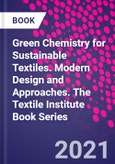Green Chemistry for Sustainable Textiles: Modern Design and Approaches provides a comprehensive survey of the latest methods in green chemistry for the reduction of the textile industry's environmental impact.
In recent years industrial R&D has been exploring more sustainable chemicals as well as eco-friendly technologies in?the textile wet processing chain, leading to a range of new techniques for sustainable textile manufacture. This book discusses and explores basic principles of green chemistry and their implementation along with other aspects of cleaner production strategies, as well as new and emerging textile technologies, providing a comprehensive reference for readers at all levels.
Potential benefits to industry from the techniques covered in this book include: Savings in water, energy and chemical consumption, waste minimization as well as disposal cost reduction, and production of high added value sustainable textile products to satisfy consumer demands for comfort, safety, aesthetic, and multi-functional performance properties.
Please Note: This is an On Demand product, delivery may take up to 11 working days after payment has been received.
Table of Contents
1. Introduction: Modern Perspectives in textile Industry2. Textile Fibers and Unsustainable Chemical Processes3. Classification of Traditional Processing Chemicals and their Negative Impacts on Product and Environment Quality4. Principles of Green Chemistry and Options for Implementation5. Sustainable Chemistry in Textile Processes 6. Positive impacts of Implementation of Green Chemistry and Clean Technology in Textile Wet Processing7. Emerging Technologies.8. Challenges and Commercialization of Green Chemistry 9. Sustainable Systems in Textile Processing and Chemistry 10. Future trends in Green ChemistryAuthors
Nabil Ibrahim Emeritus Professor, Textile Research Division, National Research Centre (NRC), Dokki, Cairo, Egypt. Nabil Ibrahim is an Emeritus Professor at the Textile Research Division, of the National Research Centre (NRC), Egypt. His main research interests are eco-friendly textile chemical processes and products, potential applications of emerging technologies like Biotechnology, Nanotechnology, Plasma technology in textile processing and their positive impacts on production, human and disposal ecology, multi-functionalization of textile materials, implementation of green chemistry principles for sustainable textile processing. Prof. Ibrahim has published more than 240 papers in peer-reviewed journals, supervised more than 60 Ph.D. and M.Sc. students, planned and implemented more than 50 R&D and industrial projects, is co-author of 9 handbook chapters, and 5 Egyptian patents. Prof. Ibrahim has received several honors, including: El-Nile-State prize, Merit-State and NRC prizes, African Union Kwame Nkrumah award, State Order of Sciences and Arts - First Class, Prof. Mostafa Tolba environment prize. Chaudhery Mustansar Hussain Adjunct Professor & Director of Laboratories, New Jersey Institute of Technology (NJIT), Newark, NJ, USA.Chaudhery Mustansar Hussain is an Adjunct Professor and Director of Laboratories at the New Jersey Institute of Technology (NJIT), Newark, NJ, USA. His research focuses on the applications of nanotechnology and advanced materials, environmental management, analytical chemistry, and other various industries. He is a prolific author and editor for Elsevier, the American Chemical Society, the Royal Society of Chemistry, John Wiley & Sons, CRC Press, and Springer.








